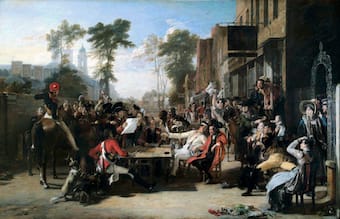Continued from
Part 1
THE quixotic gesture appeared downright irresponsible after
Sir John Moore lost his life at Corunna on January 16th, 1809.
The engagement should have seen the British army drive the French
from Spain, but turned into a desperate scramble to evacuate by
sea. Though adjudged a strategic victory today, at the time it
felt more like a defeat.
The Prime Minister, Lord Liverpool, turned once more to
Sir Arthur Wellesley to restore order and pride. Wellesley went back
to Portugal and, helped by Portuguese units under his command and
by Spanish guerillas, advanced victory by victory into Spain until
Joseph was routed at Vitoria on 21st June, 1813. The allies now
crossed the Pyrenees into France, and Napoleon, still smarting from
his ignominious retreat from Moscow,* was forced to abdicate on
April 6th, 1814. Wellesley was granted the title of Duke of
Wellington for his efforts in the Peninsular War, and
Ludwig van Beethoven composed a Battle Symphony (also known as
Wellington’s Victory) in his honour.
By
Clay Lane
Archive
Word Games
For each group of words, compose a sentence that uses all three. You can use any form of the word: for example, cat → cats, go → went, or quick → quickly, though neigh → neighbour is stretching it a bit.
This exercise uses words found in the accompanying passage.
1
Battle.
Forty.
Provide.
2
Command.
Now.
Their.
3
Cordial.
Evacuate.
Safe.
Variations:
1.
include direct and indirect speech
2.
include one or more of these words: although, because, despite, either/or, if, unless, until, when, whether, which, who
3.
use negatives (not, isn’t, neither/nor, never, nobody etc.)
Use each word below in a sentence. Try to include at least one statement, one question and one command among your sentences. Note that some verbs make awkward or meaningless words of command, e.g. need, happen.
This exercise uses words found in the accompanying passage.
1
Fight.
2
Force.
3
Command.
4
Advance.
5
Ship.
6
Turn.
7
Include.
8
Help.
9
War.
Variations:
1.
use a minimum of seven words for each sentence
2.
include negatives, e.g. isn’t, don’t, never
3.
use the words ‘must’ to make commands
4.
compose a short dialogue containing all three kinds of sentence: one statement, one question and one command
In each group below, you will find words that sound the same, but differ in spelling and also in meaning. Compose your own sentences to bring out the differences between them.
This exercise uses words found in the accompanying passage.
1.
There.
Their.
2.
Throne.
Thrown.
3.
Sees.
Seas.
Seize.
4.
But.
Butt.
5.
Scene.
Seen.
6.
Pride.
Pried.
7.
Rows.
Rose.
8.
Roil.
Royal.
9.
Him.
Hymn.
Make words by adding vowels to each group of consonants below. You may add as many vowels as you like before, between or after the consonants, but you may not add any consonants or change the order of those you have been given. See if you can beat our target of common words.
tts
(5+4)
See Words
teats.
tits.
totes.
tots.
touts.
toots.
tootsie.
tuts.
tutus.
If you like what I’m doing here on Clay Lane,
from time to time you could
buy me a coffee.
Buy Me a
Coffee is a crowdfunding website, used by over a million people. It is designed
to help content creators like me make a living from their work. ‘Buy Me a
Coffee’ prides itself on its security, and
there is no need to register.

Related Posts
Bad Day at Waterloo
By
Sir Frederick Cavendish Ponsonby
Frederick Ponsonby’s involvement in the Battle of Waterloo began early,
and it seemed to him that it went on for ever.
Read
Picture: By Walter Holmes Sullivan (1836-1908), via Wikimedia Commons. Licence: Public domain..
Source.
Posted
July 9 2021
The Button Man of Waterloo
By
Benjamin Robert Haydon
Amid all the confusion of the Battle of Waterloo, the Duke of Wellington
spotted a man in civilian clothes riding busily around on a stocky horse.
Read
Picture: By Benjamin Haydon (1786–1846), via the National Portrait Gallery and Wikimedia Commons. Licence: ? Public domain..
Source.
Posted
May 23 2021
Cut From Other Cloth
From
The Naval Sketch-Book
While inspecting troops in Colchester for duty against Napoleon,
the Duke of York came upon one man who gave new meaning to the word Veteran.
Read
Picture: By Richard Paton (1717–1791), from the Royal Museums, Greenwich, via Wikimedia Commons. Licence: Public domain..
Source.
Posted
March 17 2021
The Russians had checked it in the East, but in the West the expansion of Napoleon Bonaparte’s empire was far from over.
Read
Picture: By David Wilkie (1785-1841), Apsley House and via Wikimedia Commons. Licence: Public domain.
Source.
Posted
February 3 2020






